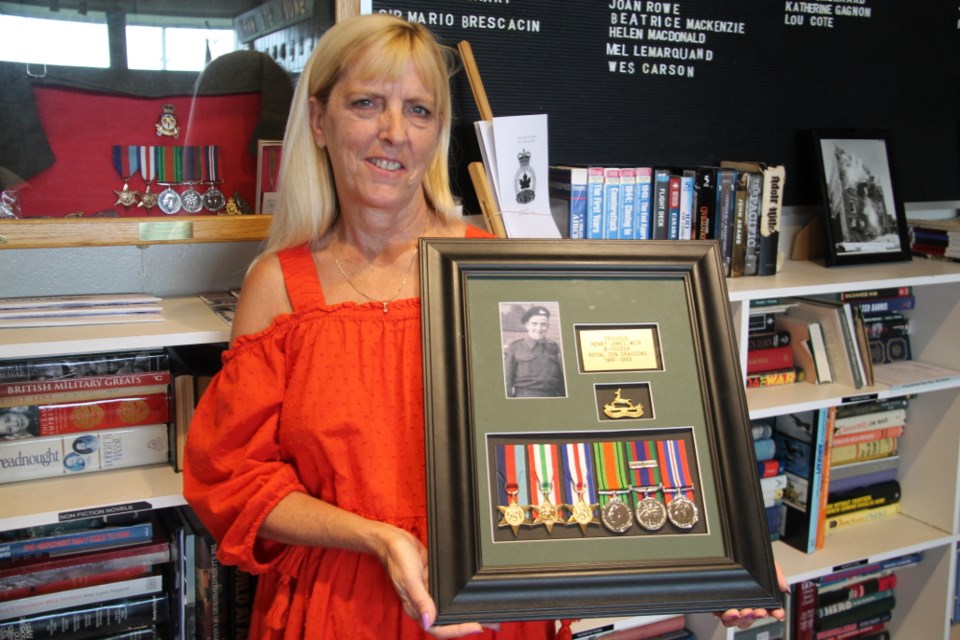An unidentified contractor's discovery and good heart has made the Sault’s Margaret Durkee very happy.
Three weeks ago, wartime items belonging to Durkee’s father, the late Henry Weir, who served in the Second World War, were misplaced during renovations at the home of Durkee’s daughter.
“I was distraught. I was very distraught,” Durkee told SooToday.
“I’m very proud of my father and very proud of what he did. To lose something like that, you cannot replace it.”
The contractor found the belongings in a dumpster and took them to the Sault’s Royal Canadian Legion Branch 25.
Weir had been a Legion member, but Legion volunteers could not trace down any of his relatives.
Durkee called the Legion and asked if the items were there.
“They said it was all brought in to them, and a contractor had found them in a dumpster,” Durkee said.
“I told them ‘I’m on my way, I’m coming to get them!’”
“We got this returned to us and we’re very, very happy about this,” Durkee said.
The historical collection includes a wartime photo of Henry Weir, replicas of his wartime medals, his Bible which he carried throughout the Second World War, and inside the book, a written personal record and some interesting documents which shed some light on his wartime service.
Weir, who passed away Feb. 19, 2010 at the age of 92, served as a driver and mechanic in the First Canadian Armoured Car Regiment, Royal Canadian Dragoons, in World War II.
Weir’s Bible, printed in the U.S. (containing a printed message to all American servicemen from President Franklin D. Roosevelt), contains a handwritten record Weir kept, indicating where he served and when.
It shows Weir saw much of Europe as the Canadian Army and its allies fought to liberate the continent from Hitler’s tyranny.
Weir was stationed at Canada’s Camp Borden at first, then in England, before seeing action in Sicily, Italy, France, Belgium, the Netherlands and Germany between 1941 and 1945.
The Bible contains a document listing Dec. 7, 1945 as Weir’s discharge date.
It also contains a document showing Weir was paid a lump sum of $974.82 in extra pay by the Canadian government for serving overseas between 1941 and 1945.
Weir wrote he was wounded while in the Netherlands Apr. 12, 1945, just three-and-a-half weeks before the war in Europe ended.
Despite the written record, Durkee said “he never spoke about the war.”
“From what I understand it (his injury) was pretty bad… I do know he had shrapnel wounds.”
“Holland being what it is (the Dutch people are well known for their gratefulness to Canadian troops for liberating their country), after the soldiers got operated on and were convalescing, the people of Holland took them into their homes and took care of them, and that’s happened with my father,” Durkee said.
“I did say to my father at one point ‘why don’t you say anything, why don’t you tell us about the war?’”
“He would only say ’I went to war so you kids didn’t have to know what it's like.’”
Once, a disturbing reminder of the war manifested itself, Durkee recalled.
“He was sitting reading a magazine and all of a sudden he went white. I said ‘Dad, are you okay?’”
“He handed me the magazine and it described manoeuvres when the enemy attacked, something went through the windshield of the truck ahead of him and the person died.”
“I said ‘Dad, was he a friend of yours?’”
“He said ‘yes,’ but he was supposed to be leading the armoured column but the other gentleman went around him and in front of him, and he ended up getting killed and Dad did not.”
“It was things like that I found out ages down the road, but he never really spoke about the war,” Durkee said.
Weir was born in Thessalon in 1917 and later lived and worked in the Sault as an Algoma Steel employee.
He joined the Canadian Army with two friends, Freddie Robbins and George King, in August, 1941.
“They decided they would volunteer and the three of them got on the train in Canada together and got off the train together, they went all the way through it together (both Robbins and King, like Weir, are deceased),” Durkee said.
Meanwhile, the identity of the contractor who handed Weir’s items over to the Legion is still not known, but Durkee is grateful to both the contractor and the Legion, remarking “there are still some nice people out there.”
